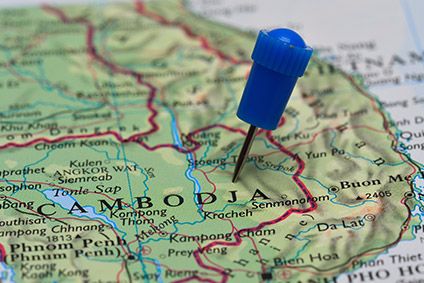
The European Commission has launched a procedure to withdraw Cambodia’s access to the duty-free Everything But Arms (EBA) preferential trade programme, and is considering the same for Myanmar over human rights violations in both countries.
Speaking at an informal meeting of Trade Ministers in Innsbruck, Austria, today (5 October), Trade Commissioner Cecilia Malmström told journalists she had notified Cambodia that the process to withdraw EBA has been launched as a result of its “severe restrictions on political rights.”

Discover B2B Marketing That Performs
Combine business intelligence and editorial excellence to reach engaged professionals across 36 leading media platforms.
“We had a high-level mission there this summer. Here there were the elections marked by harassment and intimidation, and everything but fair elections. Without clear and demonstrable improvements, this will lead to suspension of trade preferences,” she explained.
Cambodia is the second biggest EBA beneficiary and 95.5% of its EBA-eligible exports were made under EBA preferences. In turn, garments account for some 75% of Cambodia’s exports to the EU.
The EBA programme allows exporters in least developed countries to ship products duty-free to the EU. However, these trade preferences can be temporarily withdrawn in case of serious and systematic violations laid down in a list of fundamental human rights and labour right conventions in accordance with the provisions of the EU GSP (Generalised System of Preferences) regulation.
The EU first raised its concerns at the end of last year following crackdowns by Prime Minister Hun Sen in the run-up to the general election on 29 July. In July, the bloc said it was assessing Cambodia’s eligibility for key preferential trade access.

US Tariffs are shifting - will you react or anticipate?
Don’t let policy changes catch you off guard. Stay proactive with real-time data and expert analysis.
By GlobalDataThe timeframe for withdrawal is expected to be six months, after which time, Cambodia will revert to basic WTO rules.
Worsening situation in Myanmar
Meanwhile, Malmström said the Commission has also been monitoring what she describes as a “deeply worrying and worsening situation” in Myanmar with regards the Rohingya crisis.
The crisis in Rakhine State has created political uncertainty and potential risks and reputational issues for firms sourcing garments from Myanmar.
A recent report from a United Nations fact-finding mission has called for the prosecution of top military leaders for genocide and crimes against humanity. The report describes indiscriminate killings, widespread rape by the military, assaulting of children, and the burning down of entire villages. The country’s leadership has repeatedly disregarded calls from the EU and the international community to put a stop to this, Malmström says.
“We have to act when there are severe violations,” she told journalists at the meeting today. “We have notified the Myanmar authorities that a fact-finding mission will be arriving in the country in the coming days to assess the situation on the ground. And this high-level mission is in the framework of a potential withdrawal of Everything But Arms (EBA). We cannot excuse this outcome and of course and the reason is the blatant violations of human rights in Myanmar.”
The sanctions would include Myanmar’s lucrative textile industry and potentially put at risk thousands of jobs there but would not come into effect immediately.
The EU is Myanmar’s sixth-largest trading partner. The country produces garments for the likes of Adidas, Inditex, Primark and H&M, with the industry the country’s top export earner.
According to the Myanmar Garment Manufacturers Association (MGMA), Myanmar generated US$2.7bn in garment exports last year, up from $900m in 2015. Its exports to the EU accounted for the bulk of that at $1.81bn.
Addressing today’s meeting, Malmström said: “Our trade policy, as you know, is value based, so these are not just words. We are, with both of these countries of course, keeping the channels open ready to engage and to discuss.”
In her blog, she added: “We are not yet at the cliff edge and there is still time for Cambodia and Myanmar to draw themselves back from the brink. However, the consequences of the course that these countries are on are now clearly in sight.”
In a recent article on just-style, garment industry specialist David Birnbaum said that while Myanmar’s garment industry can do nothing about the government’s Rohingya policy, it can do a great deal to solve its problems of compliance.





